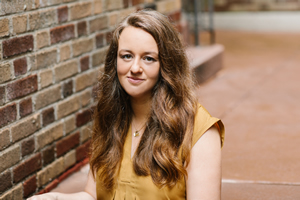|
On some days, my writing notebooks look like an inquisition, my pages topped and ended with questions: in all-caps, underlined, circled. Many are small: What do the kids want to be called? What is her work? Handwriting=obsessive or careless? Maybe she cries on the subway home, after dinner? But they're big, too: What is true, the memory of it, or the moment? Is she lacking? DO WE REQUIRE HOPE? Though they may appear frantic, a series of scribbled questions aren't signs of confusion or desperation but of sufficient curiosity on my part to propel a story forward. At every stage of my work, questions are my most essential writing tools. I use them to move through to the other side of murky. It's only by stepping into that unknown and uncomfortable space repeatedly during my process that I can become more deliberate in the story I'm telling.
For starters, you can't get to "once upon a time" if you don't ask "what if?"—sometimes in the most ludicrous way possible. Years ago I heard Tom Perrotta say his novel Little Children began by realizing that everyone at the playground had gotten there by sex. He asked himself "how can I bring those two seemingly incongruous things—sex and the playground—back together?" His marriage of two unlikely topics together as a seed for story always stuck with me, and ideas often come to me as questions. When I put a question mark at the end of a story idea or note that seems preposterous—often because it feels too challenging for me to write emotionally or logically, because it pushes against some kind of norm—I'm easing myself into a space I'm likely afraid of exploring. The non-committal stance of that question mark allows me to sit with it and remain skeptical, to be more playful in the early stages of plotting and planning. To borrow one that seems to have turned out okay, "a pair of star-crossed teen lovers kill themselves?" seems like a slightly insane idea, but it's just a question, so what's the harm in writing it down?
I have returned to a question in my notebooks and ignored it. But more often than not, after seeing it there for some time, both a threat and a promise, my curiosity gets the best of me. The question mark on that note becomes a period (or if I'm particularly pleased with myself, an exclamation point) and, rather than a far-fetched possibility for the story, some truth that I must get to come hell or high-water. I start to think about the more pressing questions that make a story: how, and why? Then I try to answer those, each question drilling down into more and more detail. Ironically, what I've removed by adding the question mark in the drafting stages is my own doubt that I could find a way in. I've discovered doors.
In revision, I look for what the reader might not know yet, and then I ask, do I know it? I make margin notes as I would on someone else's manuscript, with question marks at the end, wondering about a logical or motivational glitch or if a different plot path makes more sense. I look for details that might cause confusion or distraction for the reader and ask if they belong elsewhere, or at all. I work through drafts trying to answer those questions, filling the holes that might drive a reader nuts and distract from the story.
But I don't make all the questions disappear. It's during revision that I clarify the central question of the story, what the writer Eileen Pollack taught to me as the question a story asks a reader. Not the question it answers, but the one it asks. Because while I do know that one character's handwriting was obsessive, that he'd practiced it as a child, I don't know if we require hope—that's a personal answer. A central question—something along the lines of how we grieve or search for stability or why we continue to hope or disappoint others—is intentional, but it doesn't have an answer the author can give you, not in the text (but maybe over drinks). The best stories use what the writer knows about her fictional world—its physicality, its population, the choices characters make, all those what ifs and what abouts and whys we labor over during writing—to take readers into a space where they can ask the big questions, too.
|


